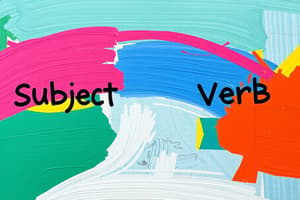Podcast
Questions and Answers
Which of the following sentences demonstrates correct subject-verb agreement?
Which of the following sentences demonstrates correct subject-verb agreement?
A compound sentence can be correctly punctuated with only a comma.
A compound sentence can be correctly punctuated with only a comma.
False (B)
What is the correct plural form of 'child'?
What is the correct plural form of 'child'?
children
She __________ (to go) to the store because she needs groceries.
She __________ (to go) to the store because she needs groceries.
Signup and view all the answers
Match the punctuation marks with their descriptions:
Match the punctuation marks with their descriptions:
Signup and view all the answers
Study Notes
Subject-Verb Agreement
- Subject-verb agreement is crucial for grammatical accuracy within sentences, where a singular subject requires a singular verb, and a plural subject requires a plural verb.
- Example of correct subject-verb agreement: "The dog barks" (singular) vs. "The dogs bark" (plural).
Punctuation in Compound Sentences
- A compound sentence involves two or more independent clauses, typically connected by coordinating conjunctions (e.g., 'and', 'but', 'or').
- The correct punctuation for compound sentences includes using a comma before coordinating conjunctions linking independent clauses.
Plural Form of 'Child'
- The correct plural form of the word "child" is "children."
- Irregular plural nouns, such as "child," change vowels or use entirely different words in their plural forms.
Completing the Sentence
- In the sentence "She __________ (to go) to the store because she needs groceries," the correct form of the verb "to go" in the present tense should be "goes."
- The completed sentence reads: "She goes to the store because she needs groceries."
Punctuation Marks and Descriptions
- Various punctuation marks serve specific purposes in writing, such as:
- Period (.) for ending statements
- Comma (,) for separating elements in lists or clauses
- Question mark (?) for ending interrogative sentences
- Exclamation mark (!) for expressing excitement or strong emotion.
- Understanding their functions enhances clarity and coherence in writing.
Studying That Suits You
Use AI to generate personalized quizzes and flashcards to suit your learning preferences.
Description
Test your knowledge on subject-verb agreement, punctuation rules, and spelling through a series of questions. Determine which sentences are correct, identify punctuation marks, and practice verb conjugation. This quiz will help reinforce your understanding of essential grammar concepts.




